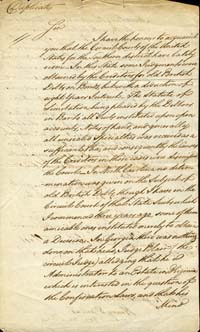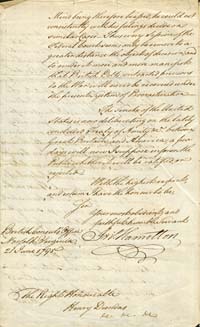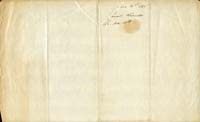John Hamilton letter to Henry Dundas (June 21, 1795)
CWF Rockefeller Library, Special Collections - SCMS2014.4
Letter of John Hamilton, British Consul at Norfolk, Virginia to Henry Dundas concerning efforts to recover "British Debts contracted previous to the War." Hamilton informs Dundas of the recent establishment of the Circuit Courts of the United States for the Southern district and the small successes made in recovering debts owed the British by American citizens. He notes that the U.S. Senate is "deliberating on the lately concluded Treaty of Amity &c. between Great Britain, and America …"; Hamilton doubts much will come of efforts to collect on the debts due to what he views as "the present System of Procrastination."
John Hamilton was British Consul at Norfolk, Virginia from 1790 until the outbreak of the War of 1812. Born in Scotland, Hamilton emigrated to Virginia and then North Carolina where he worked in his family's mercantile firm. A loyalist, Hamilton suffered great financial losses as a result of the American Revolution. During the war, he left North Carolina for British controlled New York City. He raised a regiment of North Carolina loyalists for the British military campagin in the South. Hamilton was transferred to East Florida with his regiment, the Royal North Carolina Regiment, after the British evacuated Charles Town. From there he travelled to Nova Scotia and then to London where he lobbied the government on behalf of former southern merchants. After serving as British Consul in Norfolk, Virginia, Hamilton returned to England. He died there on December 12, 1816.

Sir
I have the honour to acquaint
you that the Circuit Courts of the United
States for the Southern district have lately
risen. In this State some Judgments were
obtained by the Creditors for old British
Debts on Bonds, but with a deduction of
eight Years Interest. The Statute of
Limitation being pleaded by the Debtors
in Bar to all Suits instituted upon open
accounts, Notes of hand, and generally
all unsealed Specialties was received as a
sufficient Plea, and consequently the Causes
of the Creditors in those cases were dismissed
the Court. In North Carolina no deter-
mination was given on the Subject of
old British Debts, though I have in the
Circuit Court of that State Suits which
I commenced three years ago, some of them
amicable ones instituted merely to obtain
a Decision. In Georgia there was nothing
done on that head, Judge Blair (the
circuit Judge) alledging that he is
Administrator to an Estate in Virginia
which is interested in the question of
the Confiscation Laws, and that his
 Mind being therefore biased, he could not
Mind being therefore biased, he could not
consistently with his feelings decide on
similar Cases. This very Session of the
Federal Court seems only to remove to a
greater distance the object of decision, and
to render it more and more manifest
that British Debts contracted previous
to the War will never be recovered under
the present System of Procrastination.
The Senate of the United
States is now deliberating on the lately
concluded Treaty of Amity &c. between
Great Britain, and America; a few
days will now I suppose inform the
Public whether it will be ratified, or
rejected.
With the highest respect,
and esteem I have the honour to be,
Sir
Your most obedient, and
faithful humble Servant
Jno Hamilton
British Consul's Office
Norfolk, Virginia,
21 June 1795.
The Right Honourable
Henry Dundas
&c. &c. &c.
